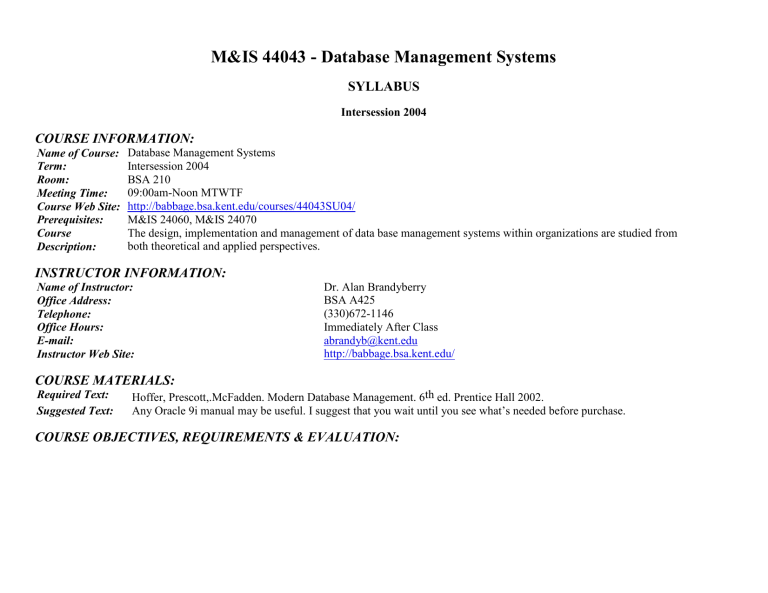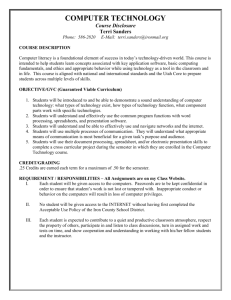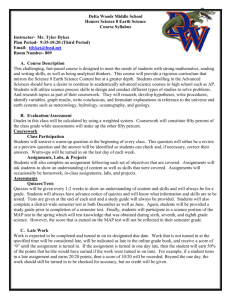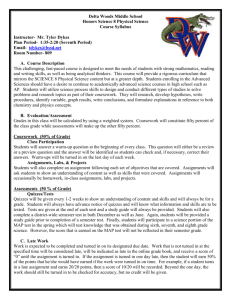M&IS 44043 - Database Management Systems

M&IS 44043 - Database Management Systems
SYLLABUS
Intersession 2004
COURSE INFORMATION:
Name of Course: Database Management Systems
Term:
Room:
Intersession 2004
BSA 210
Meeting Time: 09:00am-Noon MTWTF
Course Web Site: http://babbage.bsa.kent.edu/courses/44043SU04/
Prerequisites: M&IS 24060, M&IS 24070
Course
Description:
The design, implementation and management of data base management systems within organizations are studied from both theoretical and applied perspectives.
INSTRUCTOR INFORMATION:
Name of Instructor:
Office Address:
Telephone:
Office Hours:
E-mail:
Instructor Web Site:
Dr. Alan Brandyberry
BSA A425
(330)672-1146
Immediately After Class abrandyb@kent.edu http://babbage.bsa.kent.edu/
COURSE MATERIALS:
Required Text:
Hoffer, Prescott,.McFadden. Modern Database Management. 6th ed. Prentice Hall 2002.
Suggested Text:
Any Oracle 9i manual may be useful. I suggest that you wait until you see what’s needed before purchase.
COURSE OBJECTIVES, REQUIREMENTS & EVALUATION:
Course
Objectives:
Upon completion of this course, students will:
1. Understand the role of databases in business and other environments.
2. Be acquainted with the various concepts associated with designing, implementing, and using databases.
3. Understand the use of relevant analysis and design tools (e.g. entity relationship diagrams).
4. Obtain a working understanding of structured query language (SQL), normalization, transaction management and concurrency control.
In order to succeed in this course, it is essential that you do the assignments (reading, written, and database assignments) independently and in a timely fashion and come to class consistently and well prepared for the topic(s) to be covered. In leading the class discussion I will assume that every student has prepared for the class ahead of time; therefore, if you are not prepared, you will not be able to follow the discussion and will quickly become "lost".
Homework: Homework will be assigned on a regular basis. All assignments are to be individual efforts unless specifically assigned as a group project. The due date for assignments will be given when the work is assigned. Assignments must be handed in at the beginning of the class. If you have an excused absence you must turn in the assignment before the due date when the absence allows for planning ahead (weddings, group trips, interviews, athletics, etc.). Excused absences that are true emergencies and do not allow planning ahead will be dealt with individually. No makeups will be given to compensate for a missed assignment once the due date has passed.
All homework combined will be worth 50 pts of the total points for the course. Each assignment will be given a grade representing the percentage correct of the assignment according to the criteria given for that assignment. The assignments will all be weighted equally unless stated otherwise (i.e. an especially involved assignment might be worth 2 homeworks) so the points each assignment is worth depends on the total number of assignments given (i.e. your overall assignment % will determine your assignment grade; 90% = 45 pts).
Projects: Click here for project specifications. Only the final project will be graded; however, items will be turned in on an ongoing basis. Feedback will be provided for these items but they will not be graded until submitted with the final project. Late submission of required components will negatively impact the project grade at the rate of 2 percentage points per item per day. The project is worth 100 pts and is due June 11th.
Reading: The chapter or portion of a chapter that is to be discussed in class should be read by the student before class. You should also be prepared to answer the questions at the end of each chapter (you need not write out the answers unless specifically asked to do so). No grade will be assigned for this portion, however, see the section on quizzes concerning failure to perform in this area.
Quizzes: No unannounced or announced quizzes are planned, however, if problems are encountered concerning attendance or keeping up with the material, unannounced quizzes may be given at the discretion of the instructor. Quizzes will be included in the homework grade (1 quiz = 1 homework).
Exams: Two examinations will be given at regular intervals during the semester. Dates for exams are on the syllabus and, unless
Access: unforeseen conflicts occur, are firm. Since some flexibility in time allowed each topic is necessary, the topics covered on each exam may vary slightly from those on the syllabus. The content relevant to each exam will be announced before the exam is given. Each exam is worth 150 pts.
Students may feel free to inquire into any aspect of examinations or their scores during office hours. However, to encourage quick resolution of problems or concerns that may arise, issues must be raised with the instructor within one week following return of the exam grade. If the instructor is not contacted prior to that time the examination will be considered closed and grades finalized.
Attendance: Students are responsible for all in class announcements and material whether absence is excused or unexcused. Missed assignments/quizzes will not be made up. In certain cases (emergencies) the score will be dropped. All other cases receive a score of 0. Missed in-class exercises will receive a score of zero and cannot be made up.
Academic
Misconduct:
Any student found to be engaged in cheating, plagiarism , or any form of academic misconduct in this course, whether on exams or any other assignment, will automatically receive a grade of "F" for the course. Other actions may be taken by the
College of Business Administration and/or the University. This policy is to protect the majority of students who are honest.
In accordance with university policy, if you have a documented disability and require accommodations to obtain equal access to this course, please contact the instructor during the first week of the semester. Disabilities must be documented through the Office of Student Disability Services located in the Michael Schwartz Center.
GRADES:
Exam I
Exam II
All Homework Combined
Project
TOTAL
150 pts.
150 pts.
50 pts.
100 pts.
450 pts.
The following scale indicates the minimum course percentage required for each letter grade:
Letter-grade determinations will be made on the following percentage basis: A>90%; B>80%; C>70%; D>60%; F<60%. A lower curve may be substituted at the discretion of the instructor. Grade curving is only done at the end of the term for final grades. Do not try to anticipate the curve - target the score that will get you the desired grade on the straight scale above. **Students are welcome at any time to inquire into their current grade status during office hours.
TENTATIVE SCHEDULE:
Day Topics
May 24 Course Introduction; The Database Environment
May 25 Database Development
May 26 Modeling Data in the Organization
May 27 The Enhanced E-R Model and Business Rules.
May 28 The Enhanced E-R Model and Business Rules.
June 01 Logical Database Design and the Relational Model
June 02 Exam I
June 03 SQL, Advanced SQL
June 04 Advanced SQL
June 07 The Internet Database Environment
June 08 Data Warehousing
June 09 Data and Database Administration
June 10 Object-Oriented Data Modeling
June 11 Exam II
Readings
Chapter 1
Chapter 2
Chapter 3
Chapter 3, 4
Chapter 4
Chapter 5
Chapter 7, 8
Chapter 8
Chapter 10
Chapter 11
Chapter 12
Chapter 14
The Following Policies Apply to All Students in this Course
A. Students attending the course who do not have the proper prerequisite risk being deregistered from the class.
B. Students have responsibility to ensure they are properly enrolled in classes. You are advised to review your official class schedule (using Web for Students) during the first two weeks of the semester to ensure you are properly enrolled in this class and section. Should you find an error in your class schedule, you need to correct the error with your advising office no later than
Monday, May 24, 2004 for Intersession 2004 - Wednesday, June 16 for Summer I and Summer II - and Wednesday, July 21 for
Summer III. If registration errors are not corrected by these dates and you continue to attend and participate in classes for which you are not officially enrolled, you are advised now that you will not receive a grade at the conclusion of the semester for any class in which you are not properly registered.
C. Academic Honesty: Cheating means to misrepresent the source, nature, or other conditions of your academic work (e.g., tests, papers, projects, assignments) so as to get undeserved credit. The use of the intellectual property of others without giving them appropriate credit is a serious academic offense. It is the University's policy that cheating or plagiarism result in receiving a failing grade for the work or course. Repeat offenses result in dismissal from the University.
D. Withdrawal from a single course: For Intersession I 2004, the course withdrawal deadline is Saturday, June 5, 2004. For summer I 2004 the course withdrawal deadline is Tuesday, July 6, 2004. For Summer II 2004, the course withdrawal deadline is
Monday, July 19, 2004. For Summer III, the course withdrawal deadline is Tuesday, August 10, 2004.
Course withdrawal before the deadline results in a "W" on the official transcript; after the deadline a grade must be calculated and reported.
Please consult with an academic advisor in the Undergraduate Programs Office (Room 107, BSA – 330-672-2872) if you are having academic difficulty.
E. Students with disabilities: In accordance with University policy, if you have a documented disability and require accommodations to obtain equal access in this course, please contact the instructor at the beginning of the semester or when given an assignment for which an accommodation is required. Students with disabilities must verify their eligibility through the Office of Student Disability
Services (SDS) in the Michael Schwartz Service Center (672-3391).





